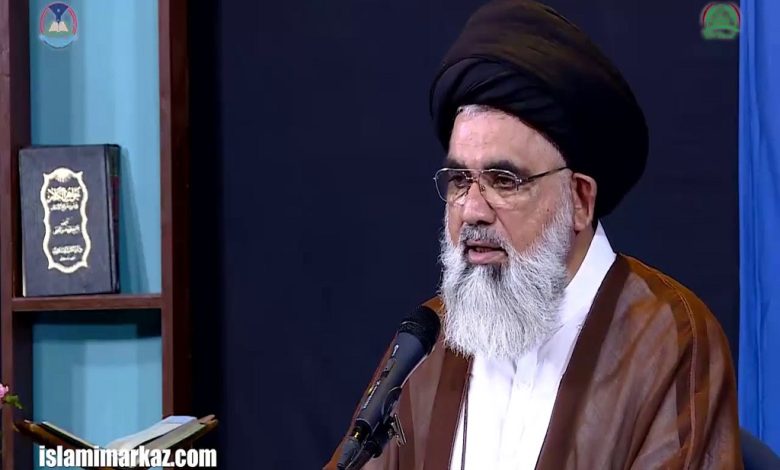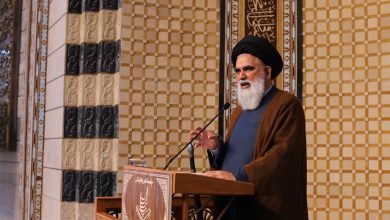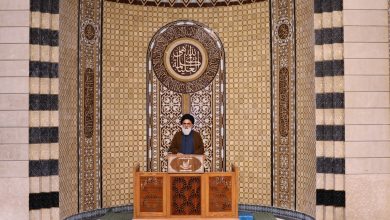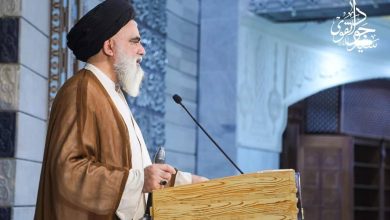
Hujjatul Islam Ustad Syed Jawad Naqvi
(Principal Jamia Orwatul Wuthqa – Lahore)
Delivered at: Masjid Baitul ul Ateeq
Lahore – Pakistan
Friday Sermon 13th June – 2025
Sermon 1: Taqwa in spending public treasury (Bait ul Maal)
Sermon 2: Iran strike has an element of internal treachery
Economic Taqwa: A Neglected Pillar of Faith
One of the most critical areas where Taqwa (God-consciousness) must be applied is the economy. The Qur’an clearly establishes wealth as a foundational element of human life and strictly prohibits its misuse or waste. A significant collapse in the moral and societal structure occurs when wealth falls into the hands of the foolish or unwise.
The Qur’an even instructs that the wealth of a foolish person should be managed by those with intellect. This applies not only to personal assets but also to public funds and state treasuries. Allah emphasizes that wealth should not be entrusted to those lacking reason because while a wise person can avoid harm, a fool may still cause damage—even without intending to.
Amirul Momineen, Imam Ali (a), in his will to his son, stresses:
“Avoid the company of a fool, for even without meaning to, he will harm you.”
Taqwa in Public Wealth and Ghanimah
In Surah Anfal, verse 69 Allah links Ghanimah (war booty) with Taqwa:
فَكُلُوا مِمَّا غَنِمْتُمْ حَلَالًا طَيِّبًا ۚ وَاتَّقُوا اللَّهَ ۚ إِنَّ اللَّهَ غَفُورٌ رَحِيمٌ {69}
Eat then of the lawful and good (things) which you have acquired in war, and be careful of (your duty to) Allah; surely Allah is Forgiving, Merciful
In Islamic jurisprudence, Ghanimah refers to specific types of wealth acquired without personal labor, such as war spoils, treasures, or minerals. Over time, the term extended to include any wealth acquired without effort. In ancient Arabia, this was often livestock taken during raids and battles.
During the Battle of Badr, Muslims, although unprepared, gained an unexpected victory, capturing many prisoners. As per tradition, captors could demand ransom (fidya) from the prisoner’s family. Initially, the captors believed they had full rights over the captives and their ransom. However, the Prophet (s) corrected this misconception, stating that these assets belong to the Islamic ruler, who would then distribute shares justly.
When captives were taken without a clear Shariah ruling on the matter, Allah revealed a strong verse rebuking the act of prioritizing material gain over divine command. The core message: whether in war or peace, Taqwa must be the guiding principle.
Taqwa, in this context, means to restrain one’s desires, even for something inherently attractive like wealth. Zuhd (detachment) is not the absence of attraction, but the control over it. The test lies in restraining from wealth that is not yours.
The Dangers of Mishandled Public Wealth
One of the most neglected fields of Taqwa today is managing public and religious funds—such as Zakat, Khums, animal hides from Eid sacrifices, and more. These resources, meant for the welfare of society, are often exploited.
For example, animal hides, which have significant value, are often thrown away or given casually to butchers. In some cases, political groups in Karachi were known to seize trucks full of hides at gunpoint during Eid.
Similarly, the forced deduction of Zakat from bank accounts under Zia-ul-Haq has faded, but the misuse of Zakat continues. Extremist and sectarian groups are often funded through such religious dues.
Even worse is the misuse of Khums. It is estimated that over 95% of Khums is not spent according to Qur’anic directives. In many cases, it is used for personal wealth accumulation, including purchasing real estate, setting up institutions under family names, and passing them on as inheritance.
A telling story from Qom:
A Maulana, who was a representative for Khums collection, was rumored to have lost around $500,000—not in gambling, but in the stock market. Many donors suffered losses and health issues, while the Maulana remained unaffected. This reflects the consequences when public funds are handled without Taqwa.
Imam Khomeini (r.a) once stated in Najaf:
“If Khums in Baghdad were collected and spent properly, no Sayyid in the world would remain poor.”
Yet, today, Khums is collected from across cities, but Sayyids remain impoverished while collectors live in luxury.
Imam Ali’s Economic Justice
When Imam Ali (a) assumed leadership, he didn’t touch religious debates or rituals. His first actions were:
- Reclaiming looted public wealth, and
- Removing corrupt governors—except the defiant Amir-e-Sham (Muawiyah).
He announced:
“I will retrieve every penny looted from the public treasury—even if it has become part of someone’s dowry.”
He carried this out and retrieved much of the wealth. Imam Ali (a)’s stand angered many beneficiaries of corruption, even some from Banu Hashim, who were later won over by Muawiyah’s wealth and rewards.
A Sunni scholar once remarked that Imam Ali (a) presented a complete system, but neither Sunni nor Shia fully explored or implemented the governance model of Wilayah and Imamat.
Historical Betrayals and Sectarianism
Another tragic example stems from the time of Imam Musa Kazim (a). He had a network of representatives who collected Khums and managed affairs. After his martyrdom, when Imam Raza (a) demanded accountability, some representatives refused to return the funds. They not only rejected his Imamat but also formed a new sect—Waqfiyya, fueled by misappropriated Khums.
Even today, after the deaths of prominent Maraji’ (religious leaders), their funds are often not transferred to the next rightful authority. Instead, family members or affiliates form parallel organizations, challenging legitimate leadership.
Conclusion: Taqwa is the Shield of the Ummah
The Qur’an teaches that Taqwa must precede and guide the handling of all wealth, especially public and religious funds. It is not just about personal piety but protecting the entire community from moral and economic decay.
This field of Taqwa—economic integrity—has been largely abandoned. The result is billions lost, public trust eroded, and a weak, lethargic foundation in our communities. As seen in Pakistan and elsewhere, without economic Taqwa, all religious rituals and institutions are vulnerable to corruption and collapse.
SERMON 2
Taqwa and the Collapse of Humanity
The absence of Taqwa (God-consciousness) leads to the erosion of fundamental human values. Without it, humanity fades, and what remains is tyranny, cruelty, oppression, transgression, genocide, and a deafening silence. To guard humanity from such a downfall, Allah made Taqwa obligatory—but we failed to regard it as essential.
From Gaza to Tehran: The Conflict Intensifies
What began in Gaza has now reached Tehran.
Just last night, Israel, with the full backing of the United States, launched strikes on major Iranian cities, specifically targeting nuclear sites and military installations of the Iranian armed forces. In the very first wave, Iran’s top IRGC leadership was martyred—similar to the strikes in Lebanon.
Among those martyred were:
- Chief of Staff General Baqeri
- IRGC Commander General Salami
- Core Commander General Rashid
- Two of Iran’s leading nuclear scientists
The attacks caused widespread devastation, and reports continue to emerge from Tehran and other cities.
Iran’s Supreme Leader, Ayatollah Khamenei, has vowed a comprehensive and powerful response. This is not a new conflict—it is part of a long-standing, deeply rooted war, now entering a new and critical phase. The escalation began in Gaza, but the environment created globally around it has led us to this point.
Media Narratives and Revolutionary Duty
Social media commentators will, as always, speak up—many because it is now a professional obligation, often spreading confusion and distraction. This matter will be addressed in our current affairs program tonight.
For those who are true companions of the Islamic Revolution, certain matters are crucial—though they may not matter to others who, regardless of circumstance, oppose the resistance. These friends of the Revolution often feel deep sorrow when such influential figures are martyred.
Over the past half-century, Iran has stood alone in facing the world’s tyrannical regimes. This is not just a political stance—it is a historic and ideological achievement. Rarely in human history has a nation confronted so many global powers for so long, without compromise.
The Ideology of Resistance
What has sustained this struggle? The ideology—the religion—that Imam Khomeini (r.a) presented through the Islamic Revolution. This is the authentic Prophetic religion, the faith of Prophet Ibrahim (a) and Imam Hussain (a).
Throughout history, various interpretations of religion have existed. Under communist regimes like the Soviet Union, all forms of religion were banned, declared to be “opium” that numbs the masses and makes them ignorant of political and social injustices.
This belief—that religion has historically been a tool used by rulers to suppress people—has become widespread. Unfortunately, even Muslims often refer back 1400 years to justify their apathy, ignoring the true and active role of religion in confronting oppression. This is the real tragedy: having access to a global, living faith but reducing it to dead historical references.
Indeed, Banu Umayyah institutionalized this opium-like religion to pacify the masses, and many rulers after them exploited it.
Imam Khomeini’s (r.a) Response: Religion as Awakening
Imam Khomeini (r.a) presented both a theoretical and practical rebuttal. He showed that religion is not sedation—it is awakening.
- Prophet Ibrahim (a) stood against tyrants and was thrown into fire—because of the same actions he consciously took to oppose injustice.
- Prophet Muhammad (s) fought alone against ignorance and oppression, even if initially confined to a small region.
- Imam Hussain (a), in the most powerful example, chose resistance and martyrdom over humiliation.
Today, in modern times, we witness children dying of starvation and bombings, yet many remain silent—numb, asleep. They are victims of the modern opium that deadens conscience.
In such a world, it is an honor for Iranian leaders and commanders to have remained steadfast in the face of global tyranny. In contrast, the so-called Arab world has sided with the enemies, turning against Iran. Remaining firm in such a battlefield for 50 years is not something that today’s social media “analysts” can understand.
Imam Hussain’s (a) Warning and Today’s Arab Rulers
On the Day of Ashura, Imam Hussain (a) delivered sermon after sermon, calling the enemy camp to reconsider. But they would not listen. In his final statement, he declared:
“You refuse to listen because your bellies are filled with haram.”
This condition persists today. Those whose bodies are nourished by haram sustenance can never side with the oppressed—they will always enable the oppressors.
Today’s Arab leaders are clear examples. Consuming haram wealth and products of haram actions has spiritually and morally corrupted them.
Yet Iran has stood firm through immense losses since the revolution, making sacrifices daily without faltering.
The Law of Rotation in Battle: Treachery Exposed
Imam Ali (a) said:
“Time turns—one day for you, another against you.”
Countries like Saudi Arabia, Egypt, Turkey, and Qatar have all betrayed Iran, the worst betrayal being their efforts to cut off Syria—Iran’s main bridge for supporting Palestinian resistance.
Today’s reality confirms: even if Israel or the U.S. occasionally show symbolic gestures, the likes of Bin Salman, UAE, Egypt, and Qatar have no sympathy for resistance movements. Their fear is that if resistance grows, they themselves would become targets within their own countries.
Internal Betrayal Within Iran
A major challenge also comes from within. Ayatollah Khamenei has stated that whenever Iran has deviated from the path of Imam Khomeini (r.a), it has suffered losses.
There exists an internal lobby, led by Javad Zarif and his circle, that placed trust in the West and Donald Trump, promoting the slogan of ending resistance and normalizing relations with the U.S.
Despite being under crippling sanctions and threats of war, they sent signals to Trump and Elon Musk, indicating readiness for negotiations. Trump responded arrogantly:
“You have two options: negotiation—or Israeli military action.”
The terms he offered were humiliating, and Iran’s leadership rightly refused to accept disgrace. Yet this lobby continued to believe in Trump, a man whose character was already exposed.
Since the beginning of the Revolution, there have always been those inside Iran who had false hopes in America and Europe. They’ve gone as far as blaming their own regime and demanding a more flexible approach. The Supreme Leader even allowed negotiations—and the results are clear: Qassem Soleimani was martyred, and even Americans now call Trump disgraceful and vile.
Trump interpreted the negotiations as Iran’s weakness, not diplomacy. When facing a beast, standing firm keeps it away—but turning your back invites attack. The beast sensed weakness and launched merciless strikes.
System Failure and Treachery Within
Most of the martyrs in this recent strike were senior army commanders, though some reports also mention civilian casualties. Iran has the capability to defend itself, so the question arises: Why didn’t the interception systems work?
The likely answer lies in false assurances from within—individuals who promised that while negotiations were ongoing, there would be no attack. This internal betrayal mirrors the support Israel receives from America, Europe, and Arab states.
A similar pro-Israel lobby exists within Iran, creating false confidence. They claimed Trump wanted peace. Now, many of our finest commanders have been lost.
Pakistan’s Silence—and Its Consequences
Pakistan, despite being a nuclear power, remains silent. Imam Khomeini (r.a) once told a parable:
Three men—a Sayyid, a Sheikh, and a common man—entered a garden and ate fruit. The owner praised them all, then beat them one by one.
This is how oppressors work. Today, while Iran is being bombed, Pakistan’s Army Chief is being invited to the U.S., praised as a “strategic partner.”
Pakistan should remember: Iran never even became a nuclear power, and yet the West couldn’t tolerate it. If Pakistan doesn’t stand with Iran now, it may be the next target—with Bin Salman and his allies being used as tools.
On one side stands Modi, on the other Netanyahu, and behind them, Trump, eager to wipe out all Islamic resistance.
This is their deception. But soon, Allah’s own plan will manifest, as it has countless times throughout history. For the Iranian people and their leaders, this is nothing new.
As Rahbar Ayatollah Khamenei said:
“Israel has now taken the first step toward its own destruction.”
May Allah protect the righteous and punish the tyrants.




